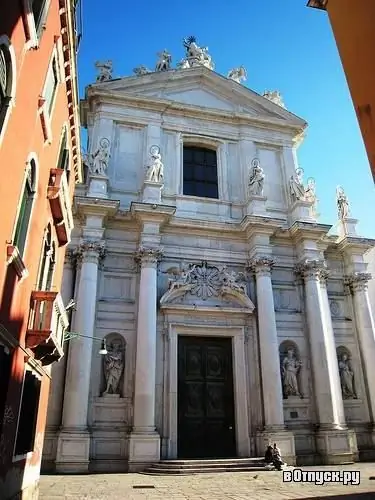
Description of the attraction
Santa Maria Assunta is a church in the Venetian quarter of Cannaregio, standing in the Campo dei Gesuiti square near the Fondation Nuove. According to some historical documents, the construction of the first church on this site began in 1148 on lands surrounded by swamps.
In 1523, Saint Ignatius Loyola visited Venice for the first time, and from there he went on a pilgrimage to Jerusalem. He returned in 1535 with a group of comrades who already then called themselves Jesuits and were ordained priests here. It took the Jesuits only two years to settle in the Venetian lagoon and gather a huge number of followers. However, in 1606, due to disagreements between Pope Paul V and the Republic of Venice, an Interdict was issued, forbidding Venice from holding religious rites. As a result, in 1657 the Jesuits were expelled from the city. During these years, Venice was involved in the war with Turkey, and Pope Alexander VIII decided to provide support for the Order of Bethlehem, which was created to help the Knights of the Cross, which were under the control of the Pope. All the property of this order, including the church, hospital and monastery, was sold to the Jesuits for 50 thousand ducats. But the small "Bethlehem" church could not accommodate all the followers of the Jesuits, so in 1715 it was demolished, and a new temple was erected in its place, called Santa Maria Assunta.
The architect of the new church was Domenico Rossi, who had previously worked on the building of San Stae. His candidacy was approved by the highest ranks of the order, but, I must say, for Rossi the task was not easy - he was forced to work according to strictly specified canons. The facade of the church consists of two tiers: the lower one is formed by eight columns, on which the rough and cracked architrave of the upper one rests. The columns support eight statues, which, together with four others in the niches, represent the Twelve Apostles. On either side of the main entrance, you can see four more statues - Saints Peter, Paul, Matthew and James Zebedee, and on the tympanum - sculptures by Giuseppe Torretti.
Inside, Santa Maria Assunta is made in the form of a Latin cross with three chapels in the central nave - a typical example of Jesuit architecture. The chapels are separated from each other by small rooms, which were probably used as confessionals in the past. Between the second and third chapels there is a remarkable pulpit by Francesco Bonazza, and along the entire corridor there are "corretti" - bars.
The central nave of the temple pales in comparison with the main altar dedicated to the Holy Trinity. Four columns, decorated with green and white marble, support the frescoed vault. There, in the altar part, you can admire the statues of Giuseppe Torretti - cherubins, little angels, archangels and cupids. The altar itself, designed by Giuseppe Pozzo, is surrounded by ten columns on which a dome of green and white marble rests.






